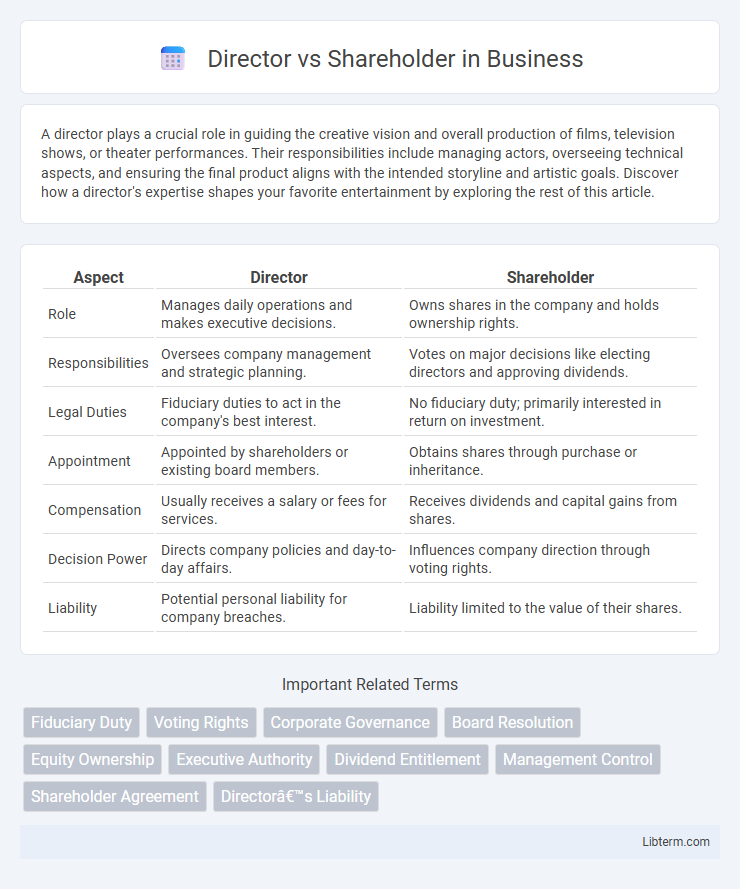A director plays a crucial role in guiding the creative vision and overall production of films, television shows, or theater performances. Their responsibilities include managing actors, overseeing technical aspects, and ensuring the final product aligns with the intended storyline and artistic goals. Discover how a director's expertise shapes your favorite entertainment by exploring the rest of this article.
Table of Comparison
| Aspect | Director | Shareholder |
|---|---|---|
| Role | Manages daily operations and makes executive decisions. | Owns shares in the company and holds ownership rights. |
| Responsibilities | Oversees company management and strategic planning. | Votes on major decisions like electing directors and approving dividends. |
| Legal Duties | Fiduciary duties to act in the company's best interest. | No fiduciary duty; primarily interested in return on investment. |
| Appointment | Appointed by shareholders or existing board members. | Obtains shares through purchase or inheritance. |
| Compensation | Usually receives a salary or fees for services. | Receives dividends and capital gains from shares. |
| Decision Power | Directs company policies and day-to-day affairs. | Influences company direction through voting rights. |
| Liability | Potential personal liability for company breaches. | Liability limited to the value of their shares. |
Introduction to Directors and Shareholders
Directors are appointed individuals responsible for managing a company's daily operations and strategic decisions, acting on behalf of the shareholders. Shareholders are the owners of the company who invest capital and hold equity, granting them voting rights on major corporate matters. The distinct roles of directors and shareholders ensure effective governance and operational oversight within a business entity.
Definition of a Director
A director is an individual appointed by shareholders to manage a company's affairs and make strategic decisions on its behalf. Directors have fiduciary duties to act in the best interests of the corporation, ensuring compliance with legal and regulatory requirements. Unlike shareholders who own the company through shares, directors hold managerial authority without ownership rights unless they also possess shares.
Definition of a Shareholder
A shareholder is an individual or entity that owns shares in a corporation, granting them partial ownership and equity interest in the company. Shareholders have voting rights proportional to their shareholdings, enabling them to influence major corporate decisions such as electing directors and approving mergers. Unlike directors who manage daily operations, shareholders primarily function as owners with rights to dividends and residual assets upon liquidation.
Key Roles and Responsibilities
Directors are responsible for the strategic management and daily operations of a company, ensuring compliance with legal and fiduciary duties to act in the corporation's best interest. Shareholders hold ownership stakes and primarily influence the company by voting on major decisions, such as electing directors and approving mergers. While directors manage and oversee company affairs, shareholders provide capital and exercise control through corporate governance mechanisms.
Legal Rights of Directors vs Shareholders
Directors possess legal rights to manage and control the company's daily operations, make strategic decisions, and act as fiduciaries responsible for the company's best interests. Shareholders hold ownership rights, including voting on major corporate issues, approving board members, and receiving dividends, but they do not engage in routine management. Legal duties of directors impose accountability and liability for breach of fiduciary duty, whereas shareholders' influence is largely limited to oversight through voting and corporate governance mechanisms.
Appointment and Removal Processes
Directors are appointed through board resolutions or shareholder meetings, with procedures often detailed in a company's articles of association or bylaws, while shareholders are established by holding shares and can only be removed through legal transfer or buyback of those shares. Removal of directors typically requires a special resolution passed by shareholders, adhering to statutory requirements such as notice periods and fair hearing rights, whereas shareholders can exit or be removed by selling or relinquishing their shares under company regulations. The appointment and removal processes emphasize corporate governance frameworks, ensuring checks and balances between directorial control and shareholder rights.
Decision-Making Authority
Directors hold the primary decision-making authority in a company, responsible for strategic planning, policy setting, and overall management, while shareholders generally influence major decisions through voting rights during annual general meetings or special resolutions. Directors act on behalf of the company and implement policies, whereas shareholders' authority is limited to electing directors and approving significant corporate actions such as mergers or amendments to the articles of association. This division ensures directors manage daily operations, and shareholders retain control over fundamental structural changes.
Financial Interests and Benefits
Directors typically receive fixed salaries, performance bonuses, and stock options as part of their financial benefits, reflecting their active role in managing the company. Shareholders gain financial interests primarily through dividends and capital gains from appreciating stock value, dependent on the company's profitability and market conditions. While directors' compensation is more predictable and contractual, shareholders' returns are variable and tied directly to the company's financial success and market performance.
Conflict of Interest: Directors vs Shareholders
Conflicts of interest between directors and shareholders often arise when directors prioritize personal gains or strategic decisions that differ from shareholder interests. Directors have fiduciary duties to act in the best interest of the company, but their decisions may sometimes benefit themselves or management at the expense of shareholder value. Shareholders typically seek transparency and accountability mechanisms, such as independent board members or shareholder voting rights, to mitigate potential conflicts and align director actions with shareholder goals.
Conclusion: Balancing Power and Accountability
Directors hold executive power to manage company operations, while shareholders possess ownership rights and influence major decisions through voting. Effective corporate governance requires balancing directors' authority with shareholders' oversight to ensure accountability and protect stakeholder interests. Clear delineation of roles enhances transparency, reduces conflicts, and supports sustainable business growth.
Director Infographic

 libterm.com
libterm.com